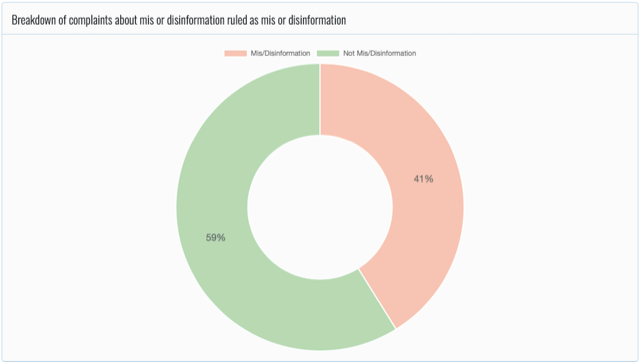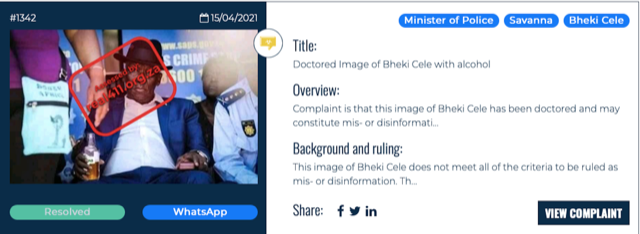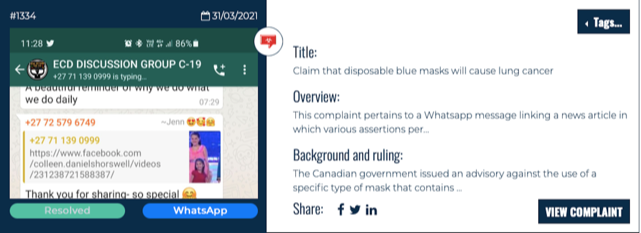OP-ED
Disinformation in a time of Covid-19: Weekly Trends in South Africa

As Covid-19 continues to wreak havoc, those who seek to cause confusion, chaos, and public harm have powerful tools of mis- and disinformation to do just that. This week, we offer a quick refresher on Real411, how it works, and what action can be taken. We look at some of the complaints recently received, what contributes to the spread of disinformation, and provide tips on how to identify instances of disinformation.
Week 8: Real411 for beginners
Real411 was developed as an independent, expert-led platform to take action against disinformation, hate speech, incitement to violence and harassment of journalists online. Unlike complaints that a user may submit to any social media platform, all complaints submitted will be assessed according to the same principles, and the reasons set out for a decision.
Real411 also offers an appeals process. Every complaint is assessed by a team of three experts (media, legal and digital), and then by a member of the secretariat (a legal professional/lawyer). Guidelines to assess each category of complaint have been developed in line with South African legislation.
If a complaint requires action, Real411 can issue an infographic and can also issue a takedown request to the social media platforms (in most instances the content is removed). Outcomes can be shared with networks and key stakeholders, including CovidComms, the government and the South African Human Rights Commission. Real411 is a South African solution to combat a growing and dangerous threat to our democracy, and over the last year has been successful in making a difference.
Through Real411, Media Monitoring Africa has been tracking disinformation trends on digital platforms since March 2020. The platform has received just over 1,350 complaints (all complaints are submitted to the platform by public users). We are currently focusing on combating anti-vaccine content, and are also gearing up for elections. The graphic below shows complaints received, submitted as disinformation, and after review and assessment, how many of those complaints were determined as disinformation. Of all the disinformation complaints submitted, 41% of those were ruled as disinformation.

There are two trends we take from these results. The first is that while we are thrilled at the number of complaints, we suspect it is only a fraction of the disinformation circulating out there. The threat posed by digital harms is significant and increasing.
The second trend is that those who take the trouble to complain generally have a solid basis for doing so, with 41% of those complaints found to be disinformation. We think this is a positive finding and believe that if more people know what to look for and if more can spot and report to Real411 we can mitigate the negative impact of such digital harms.
Tips to remember when you are browsing online platforms:
- Has the story been reported by any credible media outlets?
- Does the content invoke a strong emotional response?
- Does the content seem too good to be true?
- Are there any other sources sharing the same information?
- Check the URL for any strange numbers/added letters (this usually indicates a dodgy website; if you aren’t sure, check it on KnowNews).
Disinformation, like any other trend, seems to have its own peaks and troughs, depending on what is happening politically, who is pushing the disinformation, and what issues are being highlighted. When do we see an increase in disinformation circulating across social media platforms?
Over the last few months, a topic that has dominated the media (and online platforms) has been Covid-19 vaccines, including strategies for using different vaccines and why, and government strategies for vaccine roll-out. This issue has created an opportunity for conspiracy theories, and proponents of disinformation to thrive. The issue of vaccines is a complicated one. It is scientific and it is often difficult to easily understand all the moving parts.
More importantly, it’s a complicated public interest issue that needs to be effectively communicated to the public by those in power. This speaks to the responsibility that the government has to communicate, consistently, openly and effectively. For media it is important to take that communication, understand it, and if necessary, translate it for their audiences in order for the public to easily understand complex problems. Good communication reduces the opportunity for those trying to cause public harm, to confuse, create doubt and mistrust and spread unscientific, unverified, false information.
So, what types of complaints have we received over the last few weeks? One of the classic cases of false information (not quite disinformation, and we’ll explain why) is what is considered to be doctored images. Here we see a real image of a public figure – in this case Police Minister Bheki Cele – which has been slightly manipulated. The image is real, yes, taken from a real event; however, the bottle of beer you see in his hand is false – the original image shows a bottle of water. Whether or not this image may be considered disinformation is arguable, and the information alongside the image could cause a greater threat, depending on the context. In this instance, as a standalone image, it may not constitute disinformation; however, there is still a problem with sharing this type of manipulated image.

Another recent complaint deals with false information that could very well cause real public harm. We have seen many examples of this type of Covid-19 disinformation circulating across platforms over the last few months, and links to many complaints submitted about the wearing of masks and encouraging non-compliance with government Covid-19 regulations. This complaint specifically looks at a message circulating on WhatsApp, claiming that the Canadian government issued a warning that disposable masks were made using an “asbestos-like” substance, and will cause lung cancer if used. This is a classic example of disinformation – false information intentionally created to cause public harm. It has taken real news about action by the Canadian government and uses it to persuade readers that disposable masks cause lung cancer. DM

Remember, if you come across content on social media that could potentially be hate speech, incitement, harassment or disinformation, report it to Real411. To make it even more simple, download the Real411 mobile app.

Download the Real411 App on Google Play Store or Apple App Store.
William Bird is director of Media Monitoring Africa. Thandi Smith is head of programmes at Media Monitoring Africa.
"Information pertaining to Covid-19, vaccines, how to control the spread of the virus and potential treatments is ever-changing. Under the South African Disaster Management Act Regulation 11(5)(c) it is prohibited to publish information through any medium with the intention to deceive people on government measures to address COVID-19. We are therefore disabling the comment section on this article in order to protect both the commenting member and ourselves from potential liability. Should you have additional information that you think we should know, please email [email protected]"

















 Become an Insider
Become an Insider